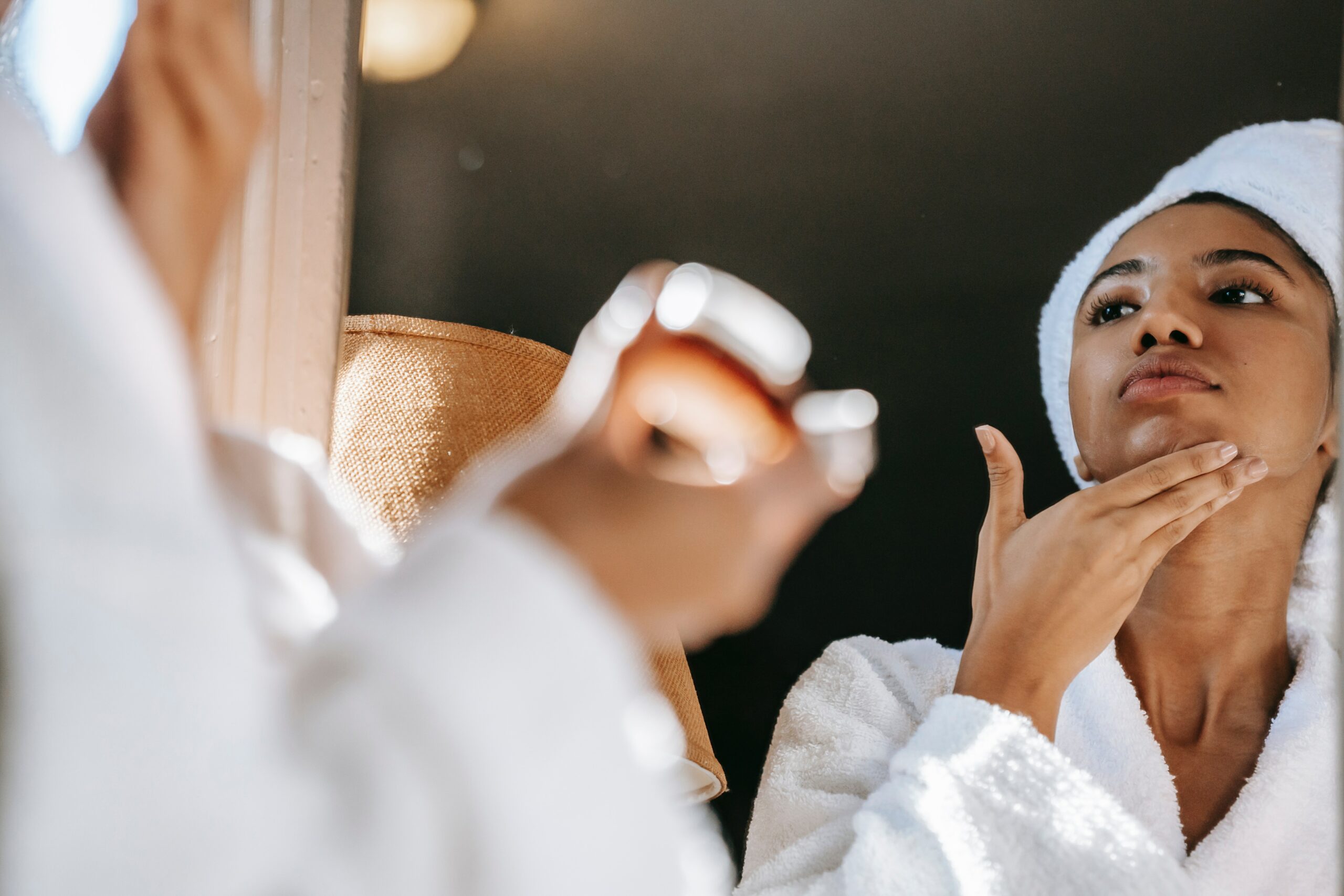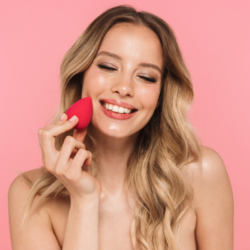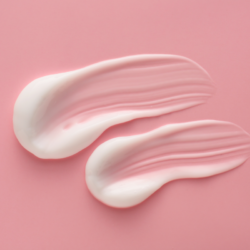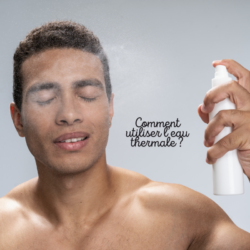Summer, with its long sunny days and outdoor activities, is a season that brings joy and relaxation. However, it can also be a trying time for our skin.Prolonged exposure to UV rays, frequent bathing in chlorinated or salty water, and variations in temperature and humidity can lead to a series of challenges for skin health.
After the summer, the skin can suffer from dehydration, loss of elasticity, the appearance of pigmentation spots and even accelerated skin ageing. These effects are mainly due to UV rays, which alter the skin’s structure and can reduce its ability to retain moisture. In addition, wind, salt and chlorine can attack the skin’s protective barrier, leaving it dry and sometimes irritated.
In this context, post-summer skin care becomes essential. It aims to deeply rehydrate the skin, repair the damage caused by the sun and prepare the epidermis for the colder months to come. The aim is to restore the skin’s natural moisture, nourish damaged layers and protect against future aggression. So it’s crucial to choose the right skincare products that meet your skin’s specific needs after the summer, to maintain its balance, health and radiance.
What are the effects of summer on the skin?
Summer, synonymous with sunshine and outdoor pursuits, can also be a trying time for our skin. Understanding the effects of this season on our skin is essential if we are to adopt the right post-summer skincare routine.
Sun exposure and its consequences
Although the sun is a source of vitamin D and well-being, it also has a considerable impact on the skin. Exposure to UV rays accelerates skin ageing, leading to the appearance of wrinkles and loss of elasticity. What’s more, UV rays can alter the DNA structure of skin cells, increasing the risk of skin cancer.
A tan, often sought after during the summer months, is in fact the skin’s defence reaction to UV rays. This process, while giving a temporary tanned complexion, can in the long term lead to irreversible damage such as pigmentation spots and sagging skin.
Skin dehydration
Summer also exposes the skin to increased dehydration. Heat and prolonged exposure to the sun can reduce the skin’s ability to retain moisture, leaving it dry and dull. What’s more, summer activities such as swimming in a pool or the sea can also contribute to drying out the skin, as chlorine and salt are drying agents.
This loss of moisture often manifests itself as a feeling of tightness, reduced elasticity and sometimes the appearance of flaking. It is therefore crucial to provide the skin with a suitable moisturiser after the summer to restore its hydrolipidic barrier and maintain its natural balance.
How do you identify your skin type?
To choose the ideal post-summer face mask, it’s vital to know your skin type. Each skin type has its own characteristics and requires specific care.
Oily, dry and combination skin
Oily skin is characterised by excessive sebum production, often resulting in a shiny appearance, particularly on the T-zone (forehead, nose, chin). It is prone to dilated pores and imperfections such as blackheads and pimples.
Conversely, dry skin lacks moisture and produces less sebum. It can appear dull, with areas of flaking and a frequent feeling of tightness. This increased sensitivity requires moisturising and nourishing skin care products.
Combination skin combines the characteristics of oily and dry skin. Generally, the T-zone is oily, while the cheeks and other areas of the face are dry. This type of skin requires a balance in care, to moisturise without excess oiliness.
How do you know your skin type?
To determine your skin type, observe it carefully. After cleansing, wait an hour without applying any product. If your skin is shiny on the T-zone and seems dry elsewhere, it’s combination. If it’s shiny all over the face, it’s probably oily. If there’s no shine and your skin feels tight or uncomfortable, it’s dry.
Another simple test is to apply a handkerchief to your face after waiting. Traces of oil on the tissue may indicate oily skin, while a complete absence of sebum suggests dry skin. If the tissue shows traces of oil only on the T-zone, you have combination skin.
Knowing your skin type is the first step in choosing the right products, particularly masks, to effectively meet your skin’s needs after the summer.
Key ingredients in after-summer masks
- Aloe Vera : Moisturising and soothing. Aloe Vera is renowned for its moisturising and soothing properties. Rich in vitamins and minerals, it helps calm skin irritations and promotes skin regeneration after exposure to the sun. Its refreshing effect makes it an ideal ingredient for after-summer masks.
- Green Tea: Antioxidants and soothing. Green tea is a powerful antioxidant. It helps protect the skin from damage caused by UV rays and pollution. Its anti-inflammatory properties help soothe irritated skin, reducing redness and promoting healthy, balanced skin.
- Hyaluronic acid: Intense hydration. Hyaluronic acid is an exceptional moisturiser. It can retain a large amount of water, helping to intensely hydrate the skin. It is particularly beneficial after summer to restore lost moisture and improve skin elasticity, leaving it supple and rejuvenated.
Which mask should I choose for my skin type?
Here’s a table summarising the different types of mask according to skin type:
| Skin type | Type of mask | Key Ingredients |
|---|---|---|
| Oily Skin | Clay-based masks | Clay, Charcoal |
| Purifying masks | Green tea, Lemon | |
| Dry skin | Moisturising cream masks | Hyaluronic acid, Aloe Vera |
| Nourishing masks | Avocado, Olive oil | |
| Combination skin | Balancing masks | Honey, Cucumber |
| Multi-zone masks | Clay, Aloe Vera | |
| Sensitive Skin | Soothing masks | Chamomile, Calendula |
| Anti-redness masks | Oatmeal, Rose |
This table provides an overview of the types of mask suitable for each skin type, as well as the beneficial ingredients to treat the specific needs of each type.
Why soothe your skin?
The skin is the human body’s first line of defence against external aggressors: pollution, dust and, above all, UV rays. That’s why it’s essential to take care of your skin, especially after the summer.
In fact,dehydrated skin is skin that lacks water. This dehydration manifests itself in a lack of suppleness, a lack of radiance and the appearance of fine dehydration lines. As all dermatologists say, good skin hydration is the best anti-ageing treatment. What’s more, it guarantees plumper skin and an ultra-bright complexion.
Regular use of a face mask will help reduce imperfections: Take blackheads, for example: the mask cleanses the pores but, above all, provides your skin with complete hydration.
Is the Slugging method effective for repairing my skin?
The slugging method, which involves applying a thick layer of an occlusive product such as Vaseline to the skin, can be very effective in repairing and moisturising dry, damaged skin. This technique helps seal in the moisture and care previously applied, preventing water loss and promoting intense hydration of the skin overnight. It is particularly useful in winter or dry climates, but can be too heavy for oily or acne-prone skin. As with any skincare product, it’s important to test a small area first to make sure there’s no negative reaction.
What’s the difference between a moisturiser and a mask?
Moisturisers and face masks have different roles in skin care. A moisturiser is designed to be applied daily. Its main function is to hydrate the skin by supplying and retaining moisture. It forms a protective barrier against external aggressions and is generally lightweight to allow rapid absorption and comfortable use throughout the day.
A mask, on the other hand, is an intensive treatment used on an occasional basis. It is generally richer in active ingredients and is designed to meet specific skin needs, such as deep hydration, purification, soothing or anti-ageing. Masks are applied in a thick layer and left on the skin for a longer period to allow the ingredients to penetrate deeply. They offer more targeted and intensive skin care than a daily moisturiser.
A thirst-quenching mask certified organic by Avril
True to its values, the Avril cosmetics brand is offering a certified organic Thirst-quenching Mask with red algae extract. It has been designed to meet the needs of all skin types lacking moisture, leaving the skin nourished, supple and, above all, protected.
What’s more, 99% of the ingredients in this face mask are of natural origin. 20% of these ingredients are from organic farming.
One or two applications a week on clean, dry skin is all you need. However, you can top up your moisturising routine with a combination of day and night care.
If you are pregnant or breast-feeding, we advise you to consult a health professional, as only he or she will be able to confirm the use of a particular product.
Avril Organic HydraQuench Face Mask is available in a 50ml tube, so you can take it with you wherever you go.
A moisturising, genuine skincare and anti-ageing mask from Biocyte
The “Eneomey Hyaluronic” mask is a skincare product designed to provide deep hydration and a soothing effect. It is a mask made from biocellulose, a very fine material of natural origin derived from coconut water, known for its exceptional moisturising properties. This mask is particularly suitable after exfoliating treatments, a day outdoors, or cosmetic procedures that can alter the skin’s protective barrier.
Key ingredients in this mask include hyaluronic acid, known for its moisturising and plumping properties, allantoin, which regenerates and softens the skin, and liquorice extract, which provides antioxidant and anti-inflammatory benefits. It also contains aloe vera for extra hydration and collagen to boost fibroblast proliferation and promote collagen synthesis.
The mask is easy to use: after opening the sachet, simply unfold the mask, remove the protective film, place on the face and leave on for 15 minutes. It is designed to adapt perfectly to all facial morphologies thanks to its biocellulose technology. After use, the mask leaves the skin instantly plumped, hydrated and soothed.





